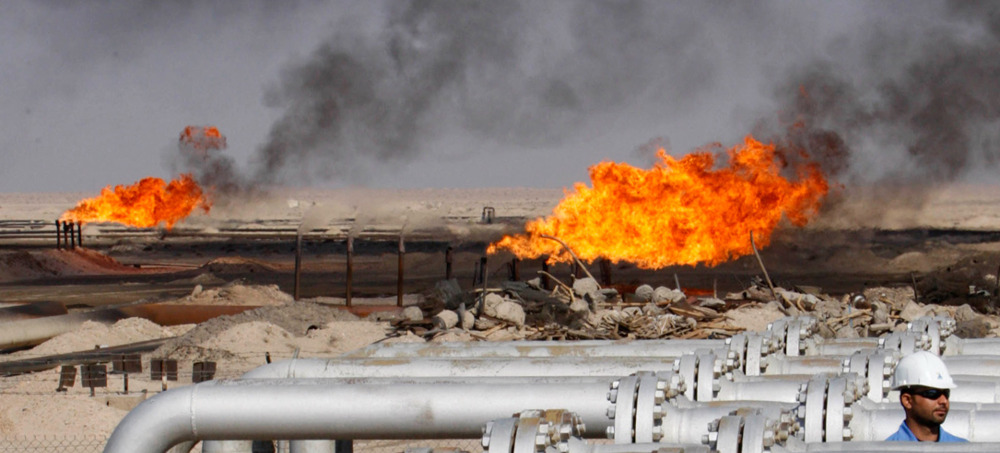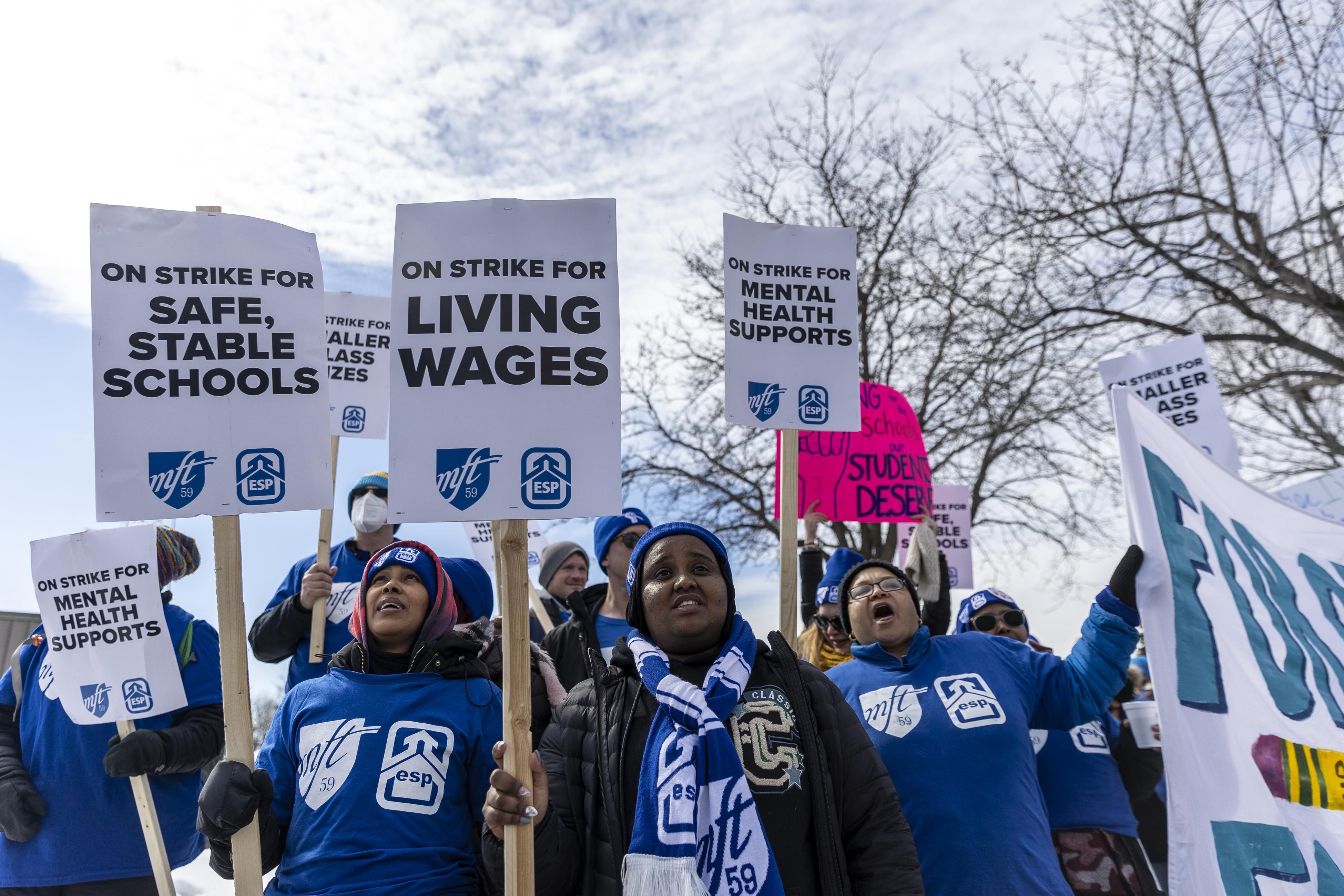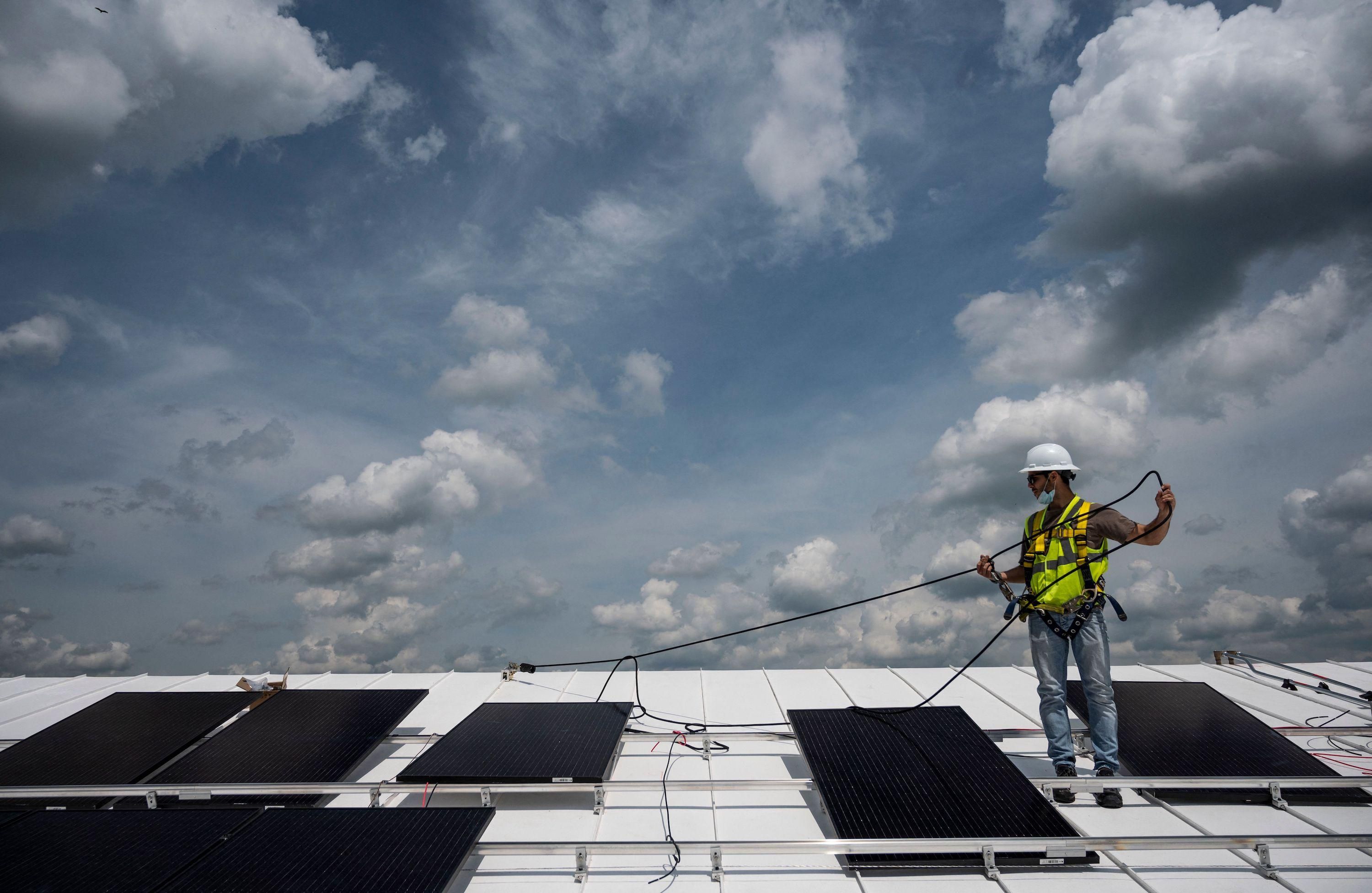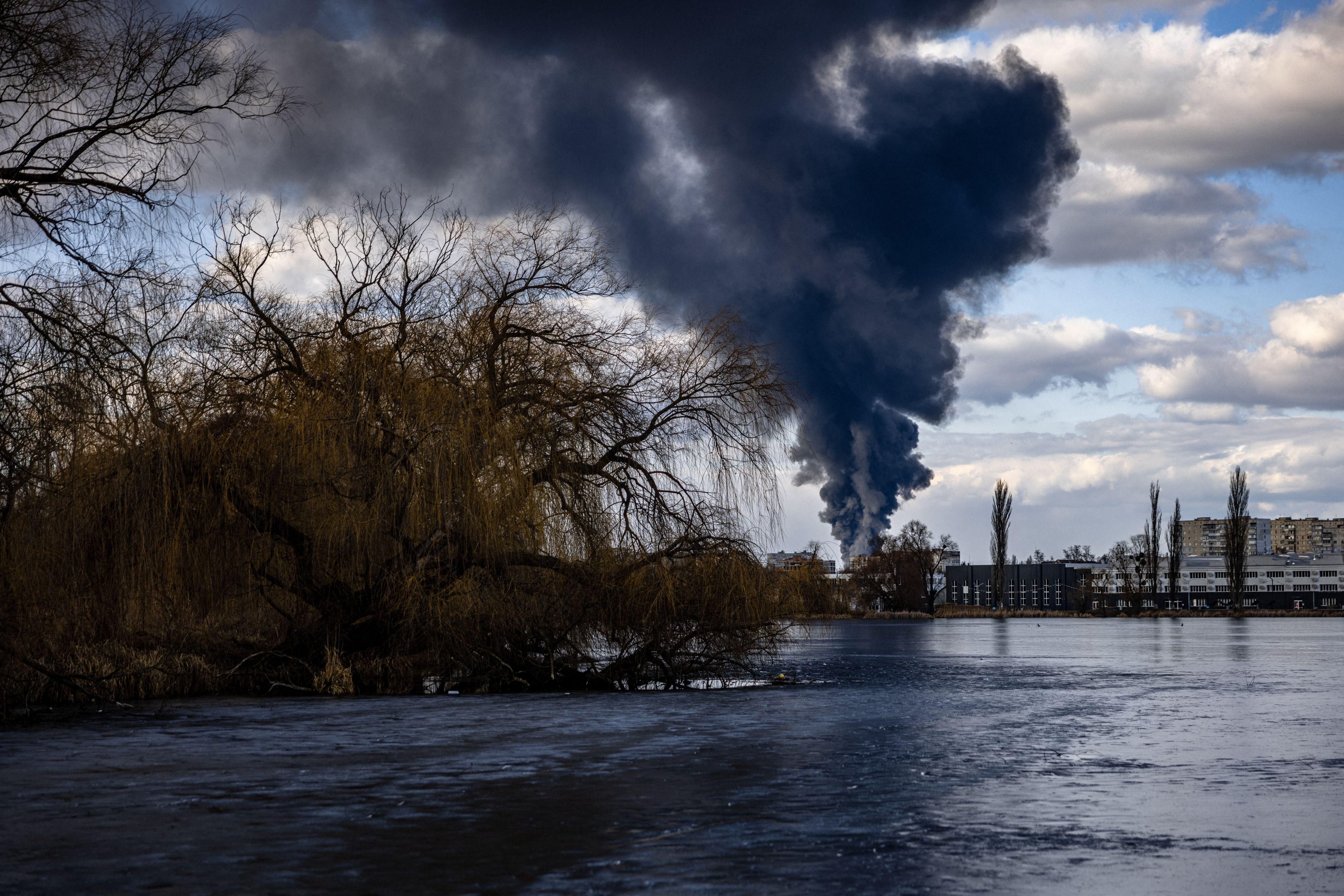Transcript
This is a rush transcript. Copy may not be in its final form.
AMY GOODMAN: This is Democracy Now!, Democracynow.org, the War and Peace Report. I’m Amy Goodman in New York, joined by Democracy Now! co-host Juan González in New Brunswick, New Jersey. Hi, Juan.
JUAN GONZÁLEZ: Hi, Amy. Welcome to all of our listeners and viewers across the country and around the world.
AMY GOODMAN: As Russia’s invasion of Ukraine enters its 14th day, we begin today’s show looking at the war’s impact on global energy markets. On Tuesday, President Biden announced a ban on imports of Russian oil, gas and coal. Britain followed up by saying it would phase out imports of Russian oil by the end of the war. The European Union has announced plans to reduce its dependence on Russian oil and gas by two-thirds this year. President Biden announced the U.S. ban during an address from the White House.
PRESIDENT JOE BIDEN: Today I am announcing the United States is targeting the main artery of Russia’s economy. We are banning all imports of Russian oil and gas and energy. That means Russian oil will no longer be acceptable at U.S. ports and the American people will deal another powerful blow to Putin’s war machine. This is a move that has strong bipartisan support in Congress and I believe in the country. Americans have rallied to support the Ukrainian people and made it clear we will not be part of subsidizing Putin’s war.
AMY GOODMAN: Britain said it would end Russian oil imports by the end of the year. Global oil and gas prices have soared over the past two weeks since Russia invaded Ukraine and experts warn prices could keep rising. Earlier this week, Russia threatened to cut off natural gas shipments to Europe in response to Western sanctions. Russia provides the E.U. countries with about 40% of their natural gas and about a quarter of its oil. Meanwhile, oil giants BP, Shell, and Exxon have announced plans to halt operations in Russia. The CEOs of Big Oil have long held close to the Russian government. Former Exxon CEO Rex Tillerson, who served as Secretary of State under Donald Trump, received Russia’s Order of Friendship Medal by Vladimir Putin in 2013. On Tuesday, analysts at Goldman Sachs said, “Given Russia’s key role in global energy supply, the global economy could soon be faced with one of the largest energy supply shocks ever.”
In recent days, the Biden administration has begun exploring other ways to increase global oil supply. Over the weekend, Biden administration officials traveled to Venezuela to discuss the possible lifting of sanctions on the nation’s oil industry. The White House has also floated the idea of Biden visiting Saudi Arabia in an effort to mend relations and to urge the kingdom to pump more oil. While the Biden administration is pushing more oil drilling, many climate activists say now is the time to invest in a green energy revolution. Democratic Senator Ed Markey of Massachusetts said, “This moment is a clarion call for the urgent need to transition to domestic clean energy so that we are never again complicit in fossil-fueled conflict.” We go now to Antonia Juhasz, investigative journalist focused on energy and climate. Antonia is the author of three books, including The Tyranny of Oil. She teaches at Tulane University in New Orleans, where she is joining us from. Antonia, welcome back to Democracy Now! Let’s begin with President Biden’s unilateral announcement of the energy ban—oil, gas and coal—from Russia, the significance of this.
ANTONIA JUHASZ: It is extremely significant, Amy, and thank you so much for having me, and thank you, Juan. There are many parts of that speech that were very important. I would say the most important is actually when Biden said, “The U.S. must transition to clean energy; that’ll mean tyrants like Putin won’t be able to use fossil fuels as weapons against other nations.” He didn’t limit it to Putin and he essentially stated that the United States was going to now see the wielding of fossil fuels as a weapon of war. That’s a profound statement and should have profound impacts on the way that we look at the way many nations and many companies use fossil fuels and the impacts on people, the economy, war, peace, the climate, et cetera.
By stating that the United States would end any oil, liquefied natural gas or coal imports, the United States was being the first nation to take that full step against Putin and to essentially say that peace in Ukraine is dependent on a shifting off of fossil fuels, ending Russia’s ability to wield fossil fuels as a weapon of war, and the world and the nation’s necessity to transition off of fossil fuels. That is the message that has been being loudly repeated out of the political leadership in the Ukraine, citizens of Ukraine, people around the world, the Secretary General of the United Nations, António Guterres. This message has kept being repeated, that a key tool towards peace is the unwinding of the global reliance on fossil fuels.
JUAN GONZÁLEZ: Antonia, at the same time, the Biden administration is looking to reorient its supplies and obviously world supplies, in discussions with Venezuela, possibilities. There seems to be an impetus to reach a deal with Iran and also the attempts to get Saudi Arabia and some of the Gulf states to increase their oil supplies. Both leaders of the Emirates and of Saudi Arabia declined to have phone calls with Biden, apparently, according to press reports. So is it really a shifting more toward renewable energy or is it an issue of having to reorient the supply routes in terms of oil?
ANTONIA JUHASZ: There’s the short and the long term. First of all, I think it is really important to say that the price spike that we have seen immediately in the aftermath of the Russian invasion of Ukraine is not about a shortage of supply of any natural resource at this point of oil or natural gas. It is energy traders trading on the expectation of a reduction in supply and pushing the price of oil up. The price of oil going up has immediately impacted the price of gasoline. If we regulated energy traders’ behavior, we could address that problem right now. But the reality is right now, the expectation is that there will be a reduction in supply of Russian oil on the global market, of Russian natural gas because Putin has already been using the supply of natural gas as a tool against Europe. So controlling the flow, the decision whether to let natural gas flow to Europe, which also has very significant impacts.
So in the short term, the Biden administration did orchestrate, which is a fairly profound shift in global energy politics—the International Energy Agency acted to coordinate its members led by the United States to increase oil supplies by 60 million barrels. That was essentially as a direct rebuff against OPEC’s unwillingness to do so. That is because Saudi Arabia is aligned with Russia and trying to protect Russian interests and is not going to put more oil into the market, in order to support Russia. It is not surprising to me that the Saudis are not taking Biden’s call. I don’t think that’s going to happen. In the short term, there is a desire to demonstrate that there will be more oil and that should hopefully reduce the stress that’s being put on the market by energy traders and again the expectation of a reduction in supply.
But I think we need to hold the administration and the rest of global leaders to their pledges, which is that they are saying, “This is a short-term solution. The long-term or even immediate-term solution is the transition to fossil fuels.” And they need to be held to those statements. Every member of the Biden administration who has spoken has reiterated that statement and they need to be held to that statement because what, if anything, this war has shown us is how insecure we are based on this dependence. The United States is the leading guzzler by far of gasoline. The power that the price of gasoline has over political elections, people’s pocketbooks, everything in between, is an incredible weakness.
The dependence of Europe on—and I call it methane gas, not natural gas, because natural gas is about 93% methane—Europe’s dependence on methane gas has put it into this position where it is having an almost impossible time divorcing itself from Putin’s power. Being unable to do that means that there isn’t a stand to be able to take against wielding the war against Ukraine. So that incredible weakness that is created by that dependence on methane gas and the idea that methane gas should be considered a quote-unquote “bridge fuel” from fossil fuels to renewable energy, I think has been put into stark—has been exposed to be not a bridge fuel at all, but rather a continued weakness not only on compounding the climate crisis, but in continuing to support autocrats in some of the most brutal regimes in the world.
I think we need to look at the actions of the oil companies, BP, Shell, even Exxon who have been unwinding and divesting their partnerships with Russia and doing so with public statements in which they say that they are doing this for humanitarian reasons, they do not want to put their money behind Putin and support his war. That sentiment, the same as Biden’s sentiment in his speech, needs to be applied and thought of to all of their partnerships with all of the other countries that are wielding control over fossil fuels as weapons. Saudi Arabia is a key example and its brutal war on Yemen. All of the same oil companies that partner with Russia and Putin partner with the Saudis, are in deep partnerships with the Saudis. And expanding this analysis to say, “How can we unplug this power, this influence?”
In the short term in the United States, we need to be really clear. We import zero liquified natural gas from Russia. We only get about 3% of our oil from Russia, which we don’t need, and we do import some coal. But we are not reliant on any of those resources, and we can immediately lead the globe in demonstrating that our goal isn’t, quote-unquote, “energy independence.” We don’t need to be independent of other nations. But what we do need to do is make our energy sources localized and democratized, so that we are using less energy by placing renewable energy sources as close to us as possible, making them democratically controlled, cooperatively controlled and operated, so that we are not simply replacing one form of extractives, massive extractives to supply renewable energy with what we are giving away for fossil fuels, but to say that the more that we can localize our energy sources, the less dependent we are on any mass extraction or mass control of that extraction of the resource. We can do that rapidly, and we can do that right away, and we can help other nations do that as well.
JUAN GONZÁLEZ: Antonia, I wanted to follow up on this issue of Europe’s position, though. Obviously, Europe did not follow directly with Biden’s decision yesterday. What about the issue of this Nord Stream 1 gas pipeline, and also that this crisis erupts just as Nord Stream 2 was getting ready to go into operation?
ANTONIA JUHASZ: This is a war that is the first significant, well, since Russia’s invasion of Crimea, the first superpower war over fossil fuels, about fossil fuels, in the climate era and that has dramatically changed the discussion of all of these issues. So this isn’t a war for oil in the way that the Iraq war was literally to capture oil fields and turn them over to oil companies. This is a war that is fueled by the financial support of fossil fuels, that is supporting Putin and giving him control over so much of world decision-making. But also the immediate impetus for the war was a dispute over a natural gas pipeline, Nord Stream 2. Nord Stream 1 is the pipeline that carries a significant amount of methane gas to Europe and it goes from Russia through Ukraine under the Black Sea to Germany. Putin has been withholding natural gas from that pipeline to Europe as he is trying to get Nord Stream 2 into action. Nord Stream 2 specifically does not go through the Ukraine, bypasses the Ukraine so that Putin wasn’t exposed to this weakness of Ukraine’s somewhat control of that pipeline, bypasses Ukraine, follows a similar path to get to Germany. It’s built, it’s ready to go, but Europe and the United States have been trying to stop Russia’s pending action against Ukraine by not letting the gas flow through Nord Stream 2. That recent decision to not let the gas go through Nord Stream 2 was the most immediate predecessor to Putin’s decision to invade Ukraine. So in many ways, this is a war that’s about a pipeline, the flow of natural gas, and about Putin’s ability to wield fossil fuels as a weapon.
AMY GOODMAN: On Monday, White House Press Secretary Jen Psaki had this response when asked by Fox if the U.S. would do more to produce oil at home.
JEN PSAKI: Let me give you the facts here, and I know that can be inconvenient but I think they are important in this moment. To the contrary, we have been clear that in the short term, supply must keep up with the demand, here and around the world while we make the shift to a secure clean energy future. We are one of the largest producers with a strong domestic oil and gas industry. We have actually produced more oil—it is at record numbers—and we will continue to produce more oil. There are 9,000 approved drilling permits that are not being used.
AMY GOODMAN: Wow. Here is Jen Psaki saying we are going to up the production of oil at a time with a huge push for renewables, and she is admitting this. So there is an interesting challenge here. You have the Ukraine bill that is racing through Congress, around $10 billion to help Ukraine. Then there is the issue of whether there is a way of crafting Build Back Better to be framed in terms of Ukraine, which would make it more palatable to Republicans. Can you talk about this, and which side is going to win? Not Republican or Democrat, but those who are deeply concerned about renewables versus a huge gush of more oil production in the United States?
ANTONIA JUHASZ: Yeah. Jen Psaki said about three days earlier that the core of the Biden administration’s agenda is to transition to clean energy and off of fossil fuels as rapidly as possible. And I think actually both are true. What I think she is doing right now is there is a huge push that was first led by the American Petroleum Institute, the largest oil company lobbying group in the United States, putting pressure—and this was now just a week and a half ago; this has all happened so quickly—on the Biden administration not to implement any sanctions on Russian oil, not because they were worried necessarily about Putin, but because of all the U.S. oil companies and Western oil companies that have such large stakes in Russia and they did not want those to be impacted.
At the same time, the American Petroleum Institute and their supporters in Congress have been pushing that the response to the war needs to be that we produce more oil and that we can’t pass Build Back Better, we can’t pass legislation that would put more restrictions, more regulations on the oil industry because obviously the solution to the war is that the United States needs to be producing so much more oil and gas. What the response of the Biden administration has been is, “Don’t worry, we are producing tons of oil and natural gas.”
The first year of an administration, just to be clear, is usually the results of the policies of the previous administration. So the Trump administration didn’t produce as much in its first year because it was still under the sway of the Obama administration’s policies. Trump then significantly, dramatically increased production over the course of his subsequent years in office, reaching a high point just before the COVID crash. This first year of the Biden administration is really the tail ends of Trump administration policies that have kept that production at record highs. Jen Psaki is saying, “Look, we’re producing all this oil and gas, so the solution, therefore, is clearly not to reduce regulation. Our regulations are not stopping you from producing.”
I believe that the administration is trying to get Build Back Better passed. If we want to rapidly transition to renewable, localized, democratized, renewable energy in the United States, that’s the bill. That’s the bill that’s in Congress right now to do it. Of course, as I’m sure your listeners know, it has been stopped by one senator, really, and that is Joe Manchin of West Virginia who is the most heavily funded fossil fuel member of Congress by a long shot right now. Obviously, coal is his primary personal financial interest, but he is the most heavily supported of the fossil fuel industry of any member of Congress right now, and he is single-handedly stopping this bill from moving forward. It is very, very hard for the administration to act on its pledges to transition to renewable energy without that legislation.
That said, there are executive orders that the administration can do and can put into place, and it proved that it could do that yesterday. When Biden gave his speech, he simultaneously released I think two executive orders that not only—that go further than the ban on the imports, but also ban U.S. companies and banks or any financiers from financing or investing in Russian energy. The one question that brings to my mind is there are still corporate holdouts. Chevron, for example, has not divested its holdings in the Caspian Pipeline. Exxon hasn’t divested its holdings in the Caspian Pipeline. They are in partnership with Russian oil, with Russia on that pipeline because it carries their oil from Kazakhstan. They really want to keep producing in Kazakhstan. Talk about a world leader that is a brutal controller of his country; that’s Kazakhstan. They don’t want to lose those holdings, and they don’t want to lose that pipeline. So there is a lot of moving parts happening here and the bottom line is to keep putting pressure on the administration, on the companies to uphold their pledges that the bottom line is to achieve first peace in Ukraine and stop Putin and then to make the transition from fossil fuels.
AMY GOODMAN: Antonia Juhasz, thank you for being with us. There is so much to talk about. Investigative journalist focused on energy and climate. Author of several books, including The Tyranny of Oil. She is speaking to us from New Orleans where she teaches at Tulane University.
Coming up, we go to London to speak with Tariq Ali about Russia’s invasion, NATO expansion in Eastern Europe and the Ukrainian president’s historic address to the House of Commons yesterday. Stay with us.









